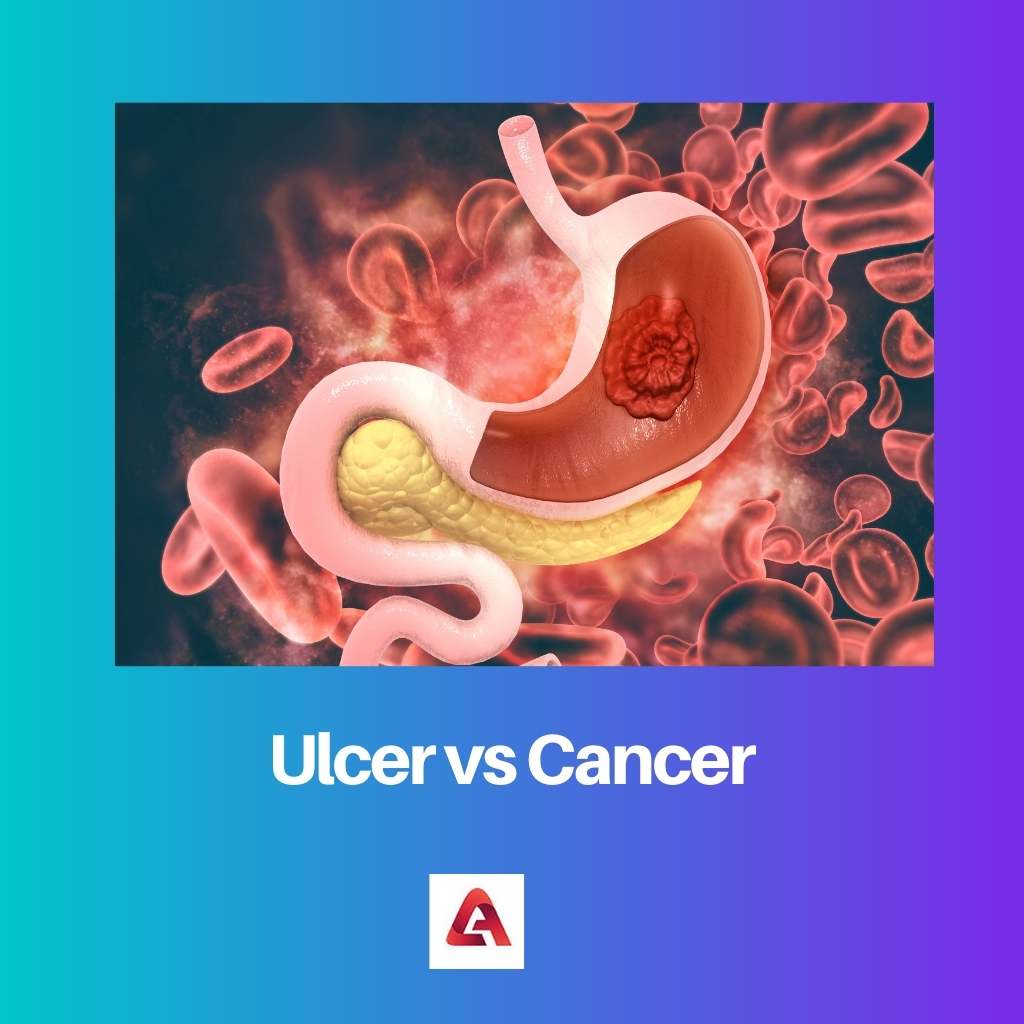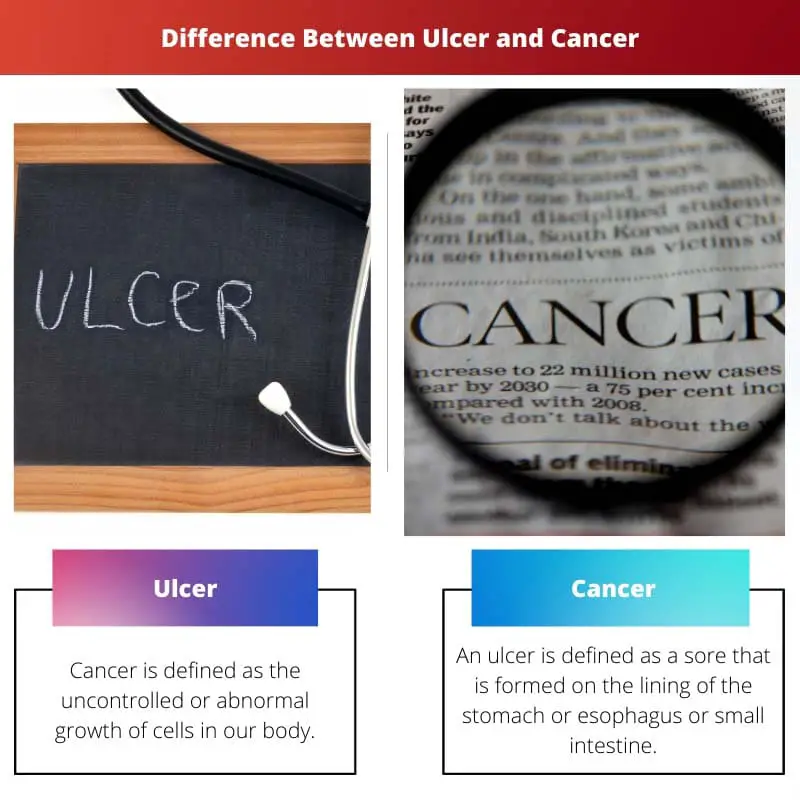Ulcers and Cancer are two completely different diseases. However, when a doctor suspects an ulcer, in the worst cases, it might turn out to be cancer after the examination.
They have various symptoms which vary from one type to another. Hence it is important always to seek the help of a doctor when there is discomfort in the body.
Let us learn some basic characteristics of these two conditions. This shall help us identify and distinguish them in a better way.
Key Takeaways
- Ulcers are localized, non-cancerous sores that affect the skin or mucous membranes, while cancer is an uncontrolled growth of abnormal cells.
- Ulcers can be caused by infection, inflammation, or pressure, while cancer results from genetic mutations and other factors.
- Treatment for ulcers focuses on symptom management and addressing underlying causes, while cancer treatment involves surgery, chemotherapy, or radiation.
Ulcer vs Cancer
Ulcers are caused by a bacterial infection or prolonged use of non-steroidal anti-inflammatory drugs (NSAIDs). Cancer is a result of abnormal cell growth in the body. Ulcers can be diagnosed through an endoscopy. Cancer may require additional imaging tests and sometimes a biopsy.

An ulcer is defined as a sore that is formed on the lining of the stomach or esophagus or small intestine. They can form on both the internal and external parts of our body.
Also, they may appear in various forms. Ulcers are most commonly found in the small intestine and are known as duodenal ulcers.
On the other hand, cancer is defined as the uncontrolled or abnormal growth of cells in our body. Cells are the basic unit of our body.
These abnormal cells are termed cancerous cells or malignant tumours. They grow in mass and separate themselves from the normal body cells.
Then they gradually travel and spread through the blood and lymph system.
Comparison Table
| Parameters | Ulcer | Cancer |
|---|---|---|
| Definition | Cancer is defined as the uncontrolled or abnormal growth of cells in our body. | An ulcer is defined as a sore that is formed on the lining of the stomach or esophagus or small intestine. |
| Diagnoses | When a doctor suspects an ulcer, he prescribes endoscopy for its diagnosis. | The diagnosis of cancer is done by a series of tests. However, the main and sure way is the biopsy. |
| Cause | The exact cause of cancer is not yet known. However, its incidence and types are found to be influenced by various factors. | An ulcer is caused by a bacterial infection. The causative agent is Helicobactor pyroli. |
| Symptoms | Symptoms include burning sensation in the gut, discomfort. | Symptoms include the presence of a lump in any part of the body, bladder dysfunction, persistent change in voice, weight loss, etc. |
| Treatment | The common treatments are chemotherapy and radiation. | The treatment for cancer includes the consumption of two antibiotics along with a protein pump inhibitor (PPI) |
What is Ulcer?
An ulcer is caused by a bacterial infection. The causative agent is Helicobacter pyroli.
Along with it, unhealthy diets with excess spices in them can also lead to ulcers.
The acids from the food consumed can create a painful reaction for people suffering from ulcers. Also, the usage of aspirin for a long period of time is a high-risk factor. Symptoms include a burning sensation in the gut and discomfort.
When a doctor suspects an ulcer, he prescribes endoscopy for its diagnosis. It is an examination of the gut. A tube attached to a camera is inserted into the stomach through the passage of the throat. Then sample pictures are collected to examine. Along with it, other tests like several blood tests, stool, and breath are done to detect the H. pyroli bacteria.
The treatment for ulcers depends upon the severity of the patient. However, it is possible through normal medical procedures. Sometimes, a high dose is prescribed, called triple therapy. This treatment includes the consumption of two antibiotics along with a protein pump inhibitor (PPI).
What is Cancer?
The exact reason for cancer is not yet known. However, its incidence and types are found to be influenced by various factors. Starting from gender and genetics to diet and environmental factors, the range is quite wide.
However, we can not say that any one particular condition causes cancer. This is because it solely depends on the patients’ genetic structure and how their body behaves.
Talking of symptoms, it has a variety. It differs from the type of cancer the patient is diagnosed with.
However, it has early symptoms or symptoms that should never be neglected.
This includes the presence of a lump in any part of the body, bladder dysfunction, persistent change in voice, weight loss, etc. For any discomfort, people should immediately seek the help of their medical professionals.
A series makes the diagnosis of cancer of tests. However, the main and sure way is the biopsy.
Here, a small section of the skin is taken as a sample. Its growth is then examined. This gives detailed information about the type and stage of the cancerous cells.
The treatment henceforth also depends upon the type and stage. However, the common ones are chemotherapy and radiation.

Main Differences Between Ulcer and Cancer
- The main difference between Ulcers and Cancer is their condition. An ulcer is a sore formed on the stomach, oesophagus, or small intestine lining. Cancer is the uncontrolled or abnormal growth of cells in our body.
- Next, coming to their cause. A bacterial infection causes an ulcer. The causative agent is the Helicobacter pyroli. On the other hand, the exact cause of cancer is not yet known. However, its incidence and types are found to be influenced by various factors.
- Symptoms are a very important factor in identifying the disease. Symptoms of Ulcer include a burning sensation in the gut and discomfort. Cancer symptoms include a lump in any part of the body, bladder dysfunction, persistent change in voice, weight loss, etc.
- When a doctor suspects an ulcer, he prescribes endoscopy for its diagnosis. A series makes the diagnosis of cancer of tests. However, the main and sure way is the biopsy.
- Last but not least, their treatment. The common treatments for ulcers are chemotherapy and radiation. The treatment for cancer includes the consumption of two antibiotics along with a protein pump inhibitor (PPI)




